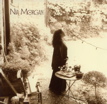
Nia Morgan: Nia Morgan (Patrin Records)
Discretion can be a form of silence, a means of being ignored. Nia Morgan's debut album is a mannered, refined and eloquent affair. No major splash has been penciled in, and no lavish promotional campaign lurks to herald its arrival, but she owns what many crave: a profound sense of integrity. This is an affectionate punch that lingers like a long anticipated kiss. As reputations go, hers is confined to a discreet coterie, but with this release the secret is out, and secrets are at their best when shared.
Vocally, Morgan sounds like a cross between Melanie without the histrionics, the criminally ignored Pina with an ethereal edge, and the divine kookiness of Kate Bush minus the drama. Her voice has a sensual huskiness, a breathy allure that adds an air of certainty to her delivery. The songs are both timely and timeless, subtle traps that enter the mind quietly, but linger there like melodic ghosts. They are haunting without being overtly poised, and possess a strange fluidity of structure that renders them unpredictable. "On the Hillside" suggests Claire Hamill at her earliest and best.
A brooding piece of psych folk, it is a masterful confection, melodious, enchanting, and deft, betraying a maturity not commonly apparent on first releases. Piano notes, almost jarring in nature, shadow box Morgan's subtle delivery. "Because the Light" has the perfect simplicity of a lost Vashti Bunyan outing, simple, unadorned, and brooding; few are capable of risking and balancing such musical sparseness. It brings to mind Sandy Denny in Fairport Convention; imagine "White Dress" blended with Melanie's mistress piece "Left-over Wine," although the use of pedal steel brings an element of Gothic country to the proceedings. It is a sweet elegy of whispers. "Poppies" proves an aching lamentation, with a strange air of optimism, and is one of the many special moments in an album sprinkled sparingly with such delights.
"Standing here with the ghosts of November Raising a glass to the beautiful world... Don't you know there's no room in this pretty town for the wounded So poppies and crosses won't make me feel sad..."
Morgan has expressed her unease at people's possible reaction to her singing in her native Welsh. Such anxiety is understandable, but unfounded.
"Gan fi Mod i" proves to be a chilling piece of near-perfect melancholia whose melody enhances the words, so a listener doesn't have to understand to appreciate their eloquence of tone. It has the glacial beauty of Stina Nordensteem's aching maladies of moodiness. "Hon" reveals Morgan at her purest. Again the Welsh language trips beautifully from her mouth, evoking a pastoral mood of unsentimental wildness. A song for rain-streaked windows, storms, and a fire roaring in the hearth. "Bregus" continues this almost elemental theme, reminding us that simplicity can be staggeringly beautiful, a cello draped melody suggestive of postcard winteriness. "Silent Times" folds the ticket on this particular journey, her voice ghosting over a backdrop of harp notes, an instrument used too rarely, but employed here with tremendous sensitivity. As it drifts into silence, the song has all the vulnerability of a pencil sketch. Morgan's approach may appear too purist at an initial hearing, but this slow burner of an album is a perfect tapestry of understatement and concision.
She may never trouble the charts, but in this world of placement she could, if her album fell into the right hands, soundtrack the selling of something commercial. For now it should be a more personal soundtrack for us all as Autumn falls and Winter looms. A small, soul-warming, delight.
